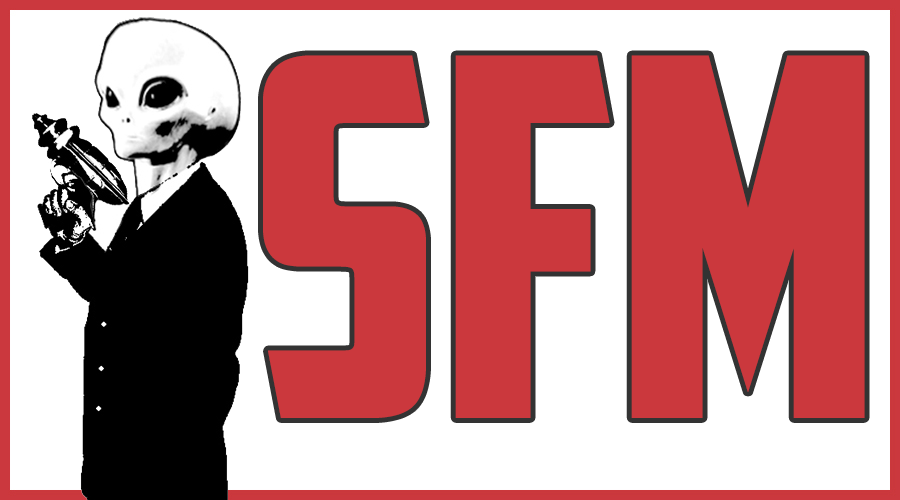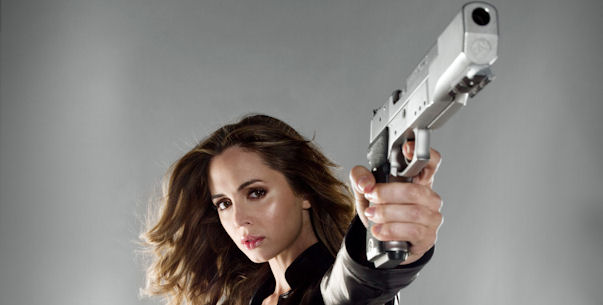
As the curtain will fall on Joss Whedon’s “Dollhouse” on Fox this season, fans are eager to hear how Whedon is taking the cancellation of the show, what went on with FOX, and how he will bounce back. Here’s an excerpt of a longer interview from the Chicago Tribune’s Maureen Ryan with Joss Whedon that addresses the run and close of “Dollhouse”:
Ryan: I’m sad that the show is kind of in its final run. How are you feeling about where things are heading and the fact that it’s ending?
Whedon: Yeah, I’d put myself in the sad camp, but right now I’m mostly just… There are a lot of stories to tie up and a lot of things to pay off and we want to make sure we go out with a bang and so right now we’re working on the bang. So I’m just focused on making it all as intense as possible.
Ryan: Yeah well, I wanted to ask you about that ending. I mean, getting the second season was such a miracle. Did you come into Season 2 thinking, “Well, I have to have a possible endgame in mind in case we don’t get a Season 3?” I guess I’m wondering, when did you start thinking about the end of Season 2 or the end of the show?
Whedon: Well, you know, from the start. But that’s not to say that I was Mr. Doom and Gloom. I am, but that’s not evidence of it. As I said before, it’s the same way we did [things] on “Buffy” every year. You go in knowing how many episodes you’ve got and you make sure that you can have some sense of closure in that time if you don’t get any more. It’s how I’ve always operated. It makes this a little bit easier because we were headed for something of an ending, obviously. We would have gone a different route had they told us to, but we always had this one in our pocket.
Ryan: So where are you now with the actual writing and production? Last I heard you were filming Episode 11.
Whedon: Yes, now we’re onto 12 and prepping 13 [which is the series finale] and going over the script. It’s hard. There is so much that we as a staff understand and so many people that we [would like to revisit before the show ends], not just our regulars, but so many other characters and there are two timelines…. There is a whole lot of narrative. Right now, I’m just sort of trying to track [the last episode] from the point of view of somebody who hasn’t been playing with it all this time and make sure that it still makes sense.
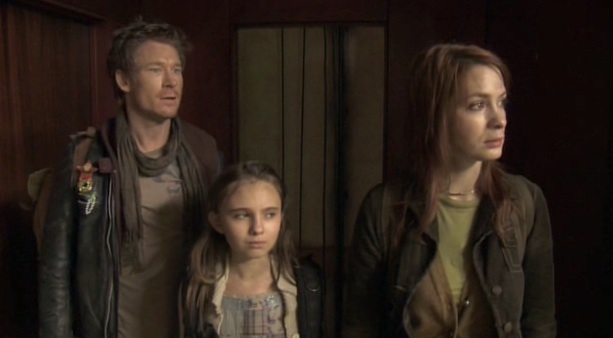 Ryan: I’m glad you brought up the second timeline. There were scenes with Felicia Day from that future timeline that were supposed to be in the first episode of Season 2 — will those be seen before the show’s done and are you going to shoot more of that kind of thing?
Ryan: I’m glad you brought up the second timeline. There were scenes with Felicia Day from that future timeline that were supposed to be in the first episode of Season 2 — will those be seen before the show’s done and are you going to shoot more of that kind of thing?
Whedon: Definitely yes. “Come with me now to the time of Mag and Zone and tiny Caroline and we’ll see where their trip eventually led and what happened to everybody in that timeline.”
Ryan: So just so I’m totally clear on what’s going to be in the last episode: You had some stuff with those folks already in the can, and you are going to shoot additional scenes with those people?
Whedon: Yeah. We had always intended to return to them. I had shot some stuff for the first episode [of Season 2] but the first episode was long and crowded with information and so we shelved it. Then when we got to the last episode [of the series], we knew that we basically wanted to pick them up in the same place, so we made the completely artistic (and in no way influenced by our utter lack of funds) decision to use some of the footage we had already shot. Completely artistic.
We were using [the post-apocalyptic scenes] as an introduction to the first episode [of Season 2]. The scenes were sort of a wraparound and now we’re just using it as in introduction to the continuing story. We had planned to continue their story over the course of several episodes, but we were so busy trying to define the show in the modern day that we just never had the opportunity to sort of go there. But at the end [of “Dollhouse’s” run] we definitely will.
Ryan: I’ll ask if the finale is called “Epitaph 2.”
Whedon: It is.
Ryan: Really?
Whedon: Yes.
Ryan: That’s wild. A fan had asked me to ask if it would be called that…
Whedon: Honestly, I just looked at [the script] this morning and it said “Epitaph Two, Return.” We might end up calling it “Santa’s Bloody Hand” but that’s what it’s called right now.
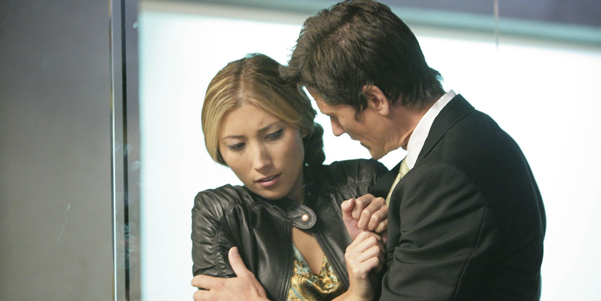 Ryan: Just talking about the bigger picture of the show and how it’s evolved, you have talked other times about the fact that you always wanted standalones as part of the “Dollhouse” mixture. And there have been some really good ones. So you’ve been on record as wanting a mixture of standalones and mythology, but I’m wondering if the current climate of network TV in general is just not going to be friendly to the amount of mythology that you would like to put out there and that people seem to respond to.
Ryan: Just talking about the bigger picture of the show and how it’s evolved, you have talked other times about the fact that you always wanted standalones as part of the “Dollhouse” mixture. And there have been some really good ones. So you’ve been on record as wanting a mixture of standalones and mythology, but I’m wondering if the current climate of network TV in general is just not going to be friendly to the amount of mythology that you would like to put out there and that people seem to respond to.
Whedon: It’s going to be friendly if the people show up. The problems that the show encountered weren’t standalone versus mythology. Basically the show didn’t really get off the ground because the network pretty much wanted to back away from the concept five minutes after they bought it and then ultimately, the show itself is also kind of odd and difficult to market. I actually think they did a good job, but it’s just not a slam-dunk concept. It wasn’t like our numbers were huge and plummeted. They were tiny and still somehow managed to plummet. We alienated both our viewers.
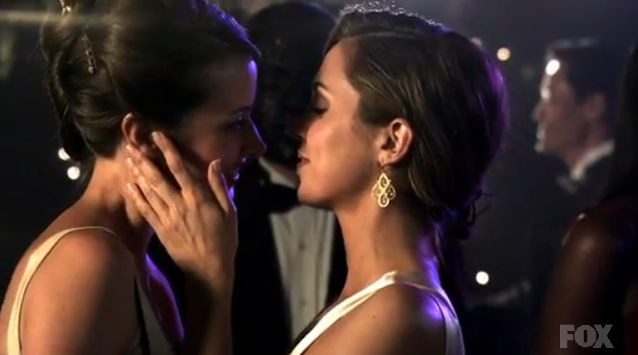 Ryan: In terms of the network backing away from the concept — you were able to kind of get back and do your thing midway through Season 1. How much of that was a factor in Season 2?
Ryan: In terms of the network backing away from the concept — you were able to kind of get back and do your thing midway through Season 1. How much of that was a factor in Season 2?
Whedon: Very much. I mean, midway through Season 1 [it was,] “OK, here is the show.” We got the espionage that the network wants, but it’s the questions about identity that we want. There are other things about the show that never came back and I didn’t really realize it until the second season, [there were] things that we were ultimately sort of dancing around.
The idea of sexuality was a big part of the show when it started and when that fell out, when the show turned into a thriller every week, it took something out of it that was kind of basic to what we were trying to do. And then also the fact that it was a thriller every week meant that we couldn’t go from genre to genre, which is really what I wanted to do. But we did manage to keep the questions about who we are and the interpersonal stuff and [there was] the amazing ensemble and everybody shining and doing cool stuff.
But there was… We always found ourselves sort of moving away from what had been part of the original spark of the show and that ultimately just makes it really hard to write these stories. It makes it twice as hard as usual. [Normally] you have that sort of kernel that you’re building on that’s completely solid. You know, “She is a little girl with super powers.” “He is a cranky doctor who always gets it right.” Whatever it is you sort of can build off that. When you’re trying to back away from your central premise at the same time as you’re making that [show,] it gets complicated.
Ryan: How do you think you backed away from it? Because she has had sex with clients, she even married a client. There have been some sexual components to missions. I’m just wondering if you could expand on that a little bit.
Whedon: Well, it’s just in the sense that, part of what was going to be the show was the idea of who these people were — [part of it was going to be about] these clients and what their fantasies were, what they expected, what they wanted. You know, what do we get from each other in our most intimate relationships, be they sexual or [whatever else]. The interest in the client kind of moved away.
We weren’t going to tell little [client] stories. They were going to be scary, exciting or funny. They weren’t going to just be people ruminating. But these little stories inevitably just took on a thriller component, and if Echo is sleeping with somebody it’s to service something else.
 Ryan: Was that moving away from that sort of thing at the request of the network?
Ryan: Was that moving away from that sort of thing at the request of the network?
Whedon: Yes, but you know… You got dominatrix Echo last season, which is kind of a joke. Luckily, it’s a good-looking joke, but it’s basically us just sort of throwing a bone to the concept [of Echo having a sexual engagement]. We’re not actually going to talk about what those things entail anymore than is [necessary] and then we move on to our thriller plot, which is… which works when it works. And I think some of the episodes coming up are ridiculously good, but I do think that was part of the problem.
Ryan: I’m just trying to wrap my head around the fact that Fox didn’t want more sex in a show.
Whedon: This is the thing that caught me off guard. First of all, network television has taken great treads backwards in terms of dealing with sexuality or the body or anything. I mean, now on cable everybody is prancing about naked and whatnot. On the networks it’s gotten different since I was last making TV.
Fox sort of has that reputation for sexy or edgy or blah, blah, blah, but they don’t actually want that and it frustrates me. It’s the classic American double standard –torture, “Great.” Sex, “Oh, that’s so bad.”
And but this was also more complicated because people responded to this [by saying], “This is trafficking. This is sex for money.” It wasn’t just sex. It was also the other implications of what was originally supposed to be somewhat more of a fantasy. The real world version of [this kind of activity] was I think what made the network really twitchy and I can’t really fault them for that. I just thought when I went in and pitched it …you know, it frightened me too [but I thought] we all got that that was what we were doing.
Ryan: Until you weren’t.
Whedon: Until we weren’t.
Ryan: Right. Well but I think that’s actually something I’ve really responded to in the show — “Dollhouse” did, to some degree, explore these ideas of exploitation and manipulation and I think and did so with some pretty intriguing female characters and male characters too. I mean, this wasn’t just her prancing around in a leather harness. There were some difficult questions about exploitation and the ickier parts of that.
Whedon: Exploitation wasn’t the whole theme. It was going to be a question of, how much of this fantasy will people let us have. Now, I didn’t make exactly the same show [that was pitched], but we did get to delve in the territory a little bit. The idea was always, how much of the fantasy will [viewers] accept and how much will they go, “You know what, this just is too much like real-world situations that are truly appalling and so I can’t let the fantasy happen.”
Because as I said before, when you’re dealing with fantasies, particularly sexual ones, you’re going off the reservation. You’re not going to be doing things that are perfectly correct. It’s supposed to be about the sides of us that we don’t want people to see. For me it was exploitation was part of it, but it was more about the idea of our identities and what we consider to be ourselves and how relating to other people affects that, how we incorporate other people in ourselves and how we project ourselves onto people and how everybody relates to everyone in their lives through the filter of their own beliefs, experiences and memories. That to me is kind of fascinating. What we think we want from each other when we say “I love you” or any of those other things is, I think, very complex and sometimes very depressing and sometimes kind of weirdly beautiful.
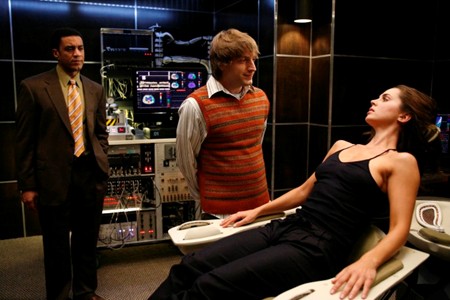 Ryan: I’m sure you’ve talked about this before, but there is obviously a parallel to creating these fictional stories for various mediums, which you do, and the creating of these realities and identities for the dolls. Was that ever part of the appeal of “Dollhouse” for you — that your job is about creating emotional states for the viewer and that’s not too far off from what is happening to the dolls or even their clients?
Ryan: I’m sure you’ve talked about this before, but there is obviously a parallel to creating these fictional stories for various mediums, which you do, and the creating of these realities and identities for the dolls. Was that ever part of the appeal of “Dollhouse” for you — that your job is about creating emotional states for the viewer and that’s not too far off from what is happening to the dolls or even their clients?
Whedon: Honestly, I didn’t really see the parallels between me and Topher until it was pointed out to me. I laughed and laughed. [The show] was created around the concept of, “Who do they want me to be?” That was literally the question we were asking at that lunch [at which Whedon and Eliza Dushku hatched the show’s concept]. When I broke down the idea for [Eliza] she said, “Well, that’s my life.” But then as I broke it down more, I realized, well, actually, it’s kind of mine too. It is sort of about the creation, but also the removable self. And the idea of becoming somebody else for a little while, which the writer gets to do all time if he is lucky.
Ryan: Do you feel like you got to say what you wanted to say with “Dollhouse”? Will you walk away from it thinking. “The stuff that really mattered to me got said”? Or will you think that it didn’t get said because of those constraints we were talking about earlier?
Whedon: Ultimately, I think we got to touch on the important subjects. The structure and the tone of the show changed, but the basic premise was there and the cast and the writers and everybody did phenomenal work. Although I definitely felt some frustration at the show having to find itself and America getting to watch while it tried, I’m really proud of where we ended up and in fact was very clear on the way in which this could continue in a new paradigm and work for everybody, should it go on.
Ryan: Will it go on in any format of any kind?
Whedon: No, I don’t think so.
Ryan: No? Web series, a comic book, anything?
Whedon: No. I’m going to finish this. What’s interesting about it is there. I don’t feel like there is some unfulfilled thing that would be well served by [continuing the story]. If I make a Web series it’s not going to be owned by Fox. Let’s be very clear on that one. Or [owned by any studio or network] — that’s not a dis on Fox. But I’ll make [a Web series] of my own and I don’t think Eliza is dying to jump onto the tiny screen right now. And it doesn’t work as a comic [because it’s] just people talking.
I’m not going to go and try and make a movie out of it because I’ve already made a movie where I had to explain who ten people who already know each other are. It was exhausting. So I think that we’ll just we’ll say, “Here is our best effort,” go out with a bang and then we will move on. I think what we will end up having done is sort of this very glorious 26-hour miniseries.
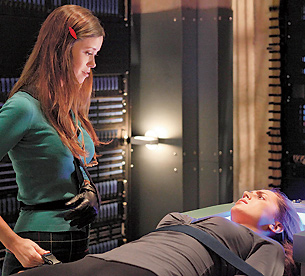 Ryan: In terms of the second half of the season, will it be pretty much the roster of guest cast and main cast that we’ve already seen or will there be new folks coming on board?
Ryan: In terms of the second half of the season, will it be pretty much the roster of guest cast and main cast that we’ve already seen or will there be new folks coming on board?
Whedon: We will see some old faces including… Well, I don’t know. I don’t know what I should tease, but yeah, we want to wrap every one up. The problem we’re having right now with the thirteenth episode is we don’t have two pennies to scrape together and we have so many people to resolve, so some of the people that we have seen in recurring fashion or just really wanted to put in, we won’t be able to [include] because we ran out of dough.
Ryan: I just wanted to talk a little bit about the different production style that you went with in Season 2 to save some dough this season. Is that something that you’ve found that you want to continue with or was it not that big of a change?
Whedon: No, for me it was enormously different and I absolutely am thrilled with what we were able to achieve. Lisa Wiegand, our director of photography, just brought so much energy and so much texture. And working in HD beats the hell out of film as far as I’m concerned. It’s a lighter package. You move faster. It is not the future. It is the present and I can’t imagine shooting on film again.
Ryan: Really?
Whedon: Yeah, I mean, [what’s great is] just the ways in which you’re able to manipulate the footage you have, the speed at which you get it and are editing it. You know that you can be handing it off as you’re shooting it. You look at a monitor while you’re shooting and you see exactly what is going to be on TV. You don’t see a grainy image and go, “Gee, I hope that works.” That’s very helpful. So we scored massively with our DP. She is tremendous, but the tech itself is also just [much better]. I just I don’t like moving slowly. I get bored and I think it affects performance and so it’s for me, this is the only way to go.
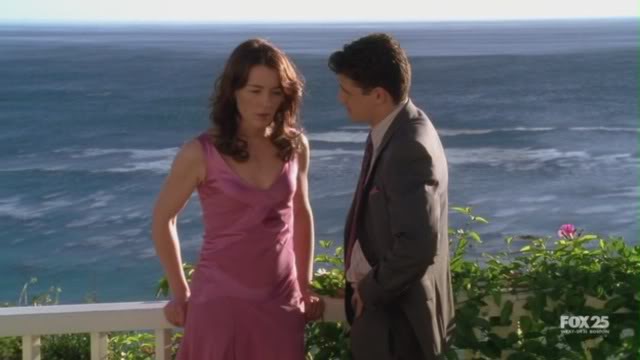 Ryan: You touched on this briefly, that the idea for “Dollhouse” was to have an anthology feel, and I think there was some of that, to the extent that you had an “origin story” for Sierra one week then a mythology episode and then an Adelle story and things like that. Was that kind of part of the appeal of trying this concept out and would that be the appeal of any future work that you might do in the TV arena?
Ryan: You touched on this briefly, that the idea for “Dollhouse” was to have an anthology feel, and I think there was some of that, to the extent that you had an “origin story” for Sierra one week then a mythology episode and then an Adelle story and things like that. Was that kind of part of the appeal of trying this concept out and would that be the appeal of any future work that you might do in the TV arena?
Whedon: It’s kind of my signature and it’s kind of my curse. My favorite thing is to shake it up, is to bring as much that’s different as I can every week — to get people to a different place. But television is largely designed to do the opposite.
Hit shows are basically designed to give people exactly what they expect, and that’s not to slam on every other show. There are plenty of shows that surprise you, that are humorous where you expect them to be maudlin or scary where you’d expect them to be romantic. But ultimately most people [watch] TV shows going, “OK, this is ‘Party of Five.’ I’m going to cry.” And I’m not really good at that.
I’m the guy who gets twitchy when shooting takes too long, who gets twitchy when he has to pull the same trick out of the same bag, because ultimately I’m interested in two things. I’m interested in entertaining people with stories and I’m interested in breaking those stories down and going, “Why am I doing this? Why are you entertained by this? What does this mean? Why?”
I mean, there has to be a reason behind the story, [something] besides the story itself. Even if I just want to evoke something that I remember. Even if it’s that small, there still has to be some reason beyond, “We need to squeeze out another 40 minutes of entertaining people.” It has to go further than that or I get not only bored, I get a little ashamed.
Ryan: When I was soliciting questions for this interview, I kept getting, “Why isn’t Joss Whedon going to cable or just going off and doing his own Joss Whedon online portal or whatever?”
Whedon: Well I can answer both those questions — because Fox forgot to cancel my show. They looked on their calendars and went, “God, we were supposed to cancel this months ago!”
The Internet is something that I’ve been investigating heavily in terms of just squeezing out another project and in terms of doing a bigger-picture Mutant Enemy portal [Mutant Enemy is the name of Whedon’s production company]. It’s not like people are running at me with money. It’s not like people are charging towards me with bags of money. The economy isn’t the best ever, but it’s my feeling that for a small investment, you could have quite an extraordinary return.
As far as cable, I’ve started taking a couple of meetings and stuff. I’ve definitely learned “Oh, cable and network TV are different.” [laughs] I’m not the brightest fellow and so I’ve just started to go, “Those guys can do whatever they want!”
Of course that is not actually the case once it gets up on the screen. The restrictions are fewer, but the process of developing it with a studio and a network, even a cable network, is still rough. It takes an enormous amount of time to run a show and to get it off the ground takes just a huge amount of steel. I’m interested in it. But for me, the Internet is slightly more interesting right now just because I feel like we have to get in there and start figuring out how to create entertainment without the networks and the studios, because they’re basically trying to figure out how to create and entertain without us.
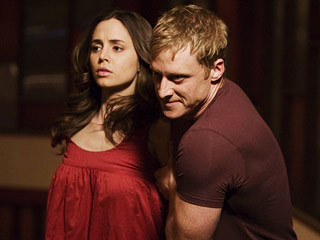 Ryan: Yeah, I think you’re right there, but as you say, it’s not easy to kind of create a new model for how everyone gets paid and makes what they want to make.
Ryan: Yeah, I think you’re right there, but as you say, it’s not easy to kind of create a new model for how everyone gets paid and makes what they want to make.
Whedon: Yeah, but people aren’t going to make what they want to make anymore. That’s not going to happen. The rainbow, the pot of gold at the end of the rainbow got smaller, significantly smaller. [Television is] less and less of a lucrative equation.
Residual checks that are so important to the writer, they’re coming in for “Dollhouse” and they’re pennies because they’re not re-running it. They’re just putting it on Hulu. So that whole system is crumbling and with the advent of the new technology, crews are going to get smaller and when things move to the Internet, there is no format where people make the kind of money they’ve made in television.
I think the idea is going to be to create enough jobs so that more people are working so that they can work on more things and that the middle-class writer can emerge and [right now that person is] sort of being squeezed out.
You know, we didn’t win the [writers’] strike. It didn’t go our way. The artistic community is more and more left out of the equation, so the trick is going to be finding out how to make the Internet work in such a way that people [can get by] because it’s not going to pay TV money. It’s not. In fact, people are going to have to be entering the business less with the idea of making a fortune and more of the idea of just making product, getting it done, getting it out there and then hoping that there is a way in which it can support [a creative community].
Keep it here on SciFiMafia! We have more from this interview where Joss Whedon continues to talk about what his next projects will be.
[Source] ChicagoTribune

